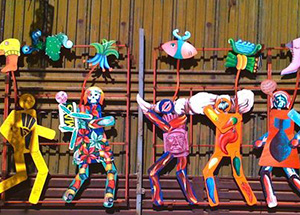Colleges And Universities Should Become Sanctuaries For The Undocumented

Immigrants are among the groups most vulnerable to a Trump presidency, but colleges and universities can protect their students, faculty and staff from Immigration and Customs Enforcement (ICE) by declaring themselves sanctuaries for undocumented people. There are currently over 700,000 students in the United States who have been approved for Deferred Action for Childhood Arrivals (DACA), Obama’s program that protects them from deportation and provides work permits. All of these students are facing possible deportation the day Donald Trump takes up residence in the White House.
At colleges and universities across the nation, including Lewis & Clark, Pomona, Smith, U Mass Amherst, Brown, Yale, Harvard, Pitzer, Scripps, Stanford, Columbia, Berea, Bard, University of Wisconsin, Madison, University of Illinois, Urbana-Champagne and Georgetown, petitions have gathered thousands of signatures in support of declaring these institutions as Sanctuaries. For educators, this is personal. We do not intend to sit by as our students and staff are rounded up by ICE officers on our campus and deported.
In the 1980s, religious groups and solidarity organizations gave birth to the sanctuary movement by protecting Central Americans fleeing violent civil wars and brutal governments. By 1987, 440 cities had declared themselves sanctuaries for people feeling violence in Central America.
The idea of sanctuary is based on a long-standing Judeo-Christian principle of using churches and synagogues as places of refuge for those escaping unjust laws. The Central America sanctuary movement was also inspired by the nineteenth-century Underground Railroad that helped ferry escaped slaves to freedom in the North and in Canada.
President-elect Trump has promised to deport 11 million undocumented immigrants, to end DACA on Day One, and to build his infamous border wall. Undocumented students justifiably fear that ICE will come knocking on their doors given that they have provided the government with all of their information in applying for DACA. Some have argued convincingly that Trump’s plans for mass deportations and building a border wall are unrealistic given the resources and logistics required, but Trump’s plan has always been to make life unbearable for immigrants and thereby force them to leave.
Kris Kobach, an anti-immigrant hard-liner, who is part of Trump’s transition team, was the architect of Arizona’s draconian and racist SB 1070 law that targeted all Latinos for immigration enforcement. Although the legal process makes it cumbersome to officially deport millions of immigrants, all of whom would need to have a hearing, millions could be forced out through “voluntary removal” at the border.
Former President Bill Clinton removed 1.8 million immigrants during his tenure, most of them through “voluntary removal.” And we shouldn’t forget that President Obama deported two and half million immigrants during his tenure, far more than any other president. Without having to knock on 11 million doors, Trump can use highly publicized raids in workplaces, schools and hospitals to terrorize immigrants. And there is no reason to believe he won’t do just that. In fact, he has promised his constituents that he would.
The idea of placing millions of immigrants in detention camps and removing them from this country may seem far-fetched, but we have several historical precedents for this in the twentieth century. In the 1930s, in the midst of the Great Depression up to a million Mexicans were “repatriated” to Mexico with no formal deportation hearings. In 1954, more than a million Mexicans were sent back to Mexico during “Operation Wetback” with hundreds of immigration officers rapidly processing the deportees in temporary detention camps before flying them out of the country. So, while it would be logistically complicated, a motivated president could conceivably deport upwards of one million immigrants a year, and “voluntarily remove” many more.
There are at least 33 cities in the US that have become official Sanctuary Cities for immigrants, meaning that city employees and police are banned from inquiring about immigration status. Many sheriffs throughout the country have also stopped cooperating with ICE detainers arguing that such cooperation violates the constitutional right not to be denied liberty when there are no pending charges. Churches, synagogues and other houses of worship have long been understood to be places of sanctuary stretching back to the Early Christians.
Facing this latest assault on immigrants by President-elect Trump, colleges and universities should become new places for Sanctuary for the more than 11 million undocumented in our country. While it may be perfectly legal to deport students who have grown up their entire lives in this country, it is not humane to split apart families and banish them from the only communities they know. Colleges and universities need to stand up for humanity and protect the undocumented from the cruel and inhumane policies of our next president.
Latin American and Latino Studies is located in Miller Center on the Undergraduate Campus.
MSC: 30
voice 503-768-7419
fax 503-768-7434
Director Matt Johnston, Associate Professor of Art History
Latin American and Latino Studies
Lewis & Clark
615 S. Palatine Hill Road
Portland OR 97219

